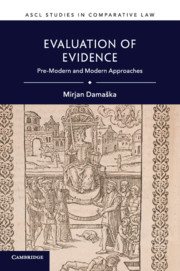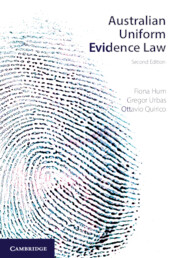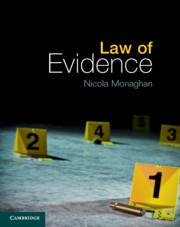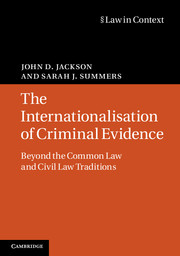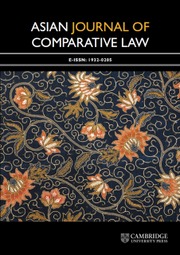Evaluation of Evidence
Pre-Modern and Modern Approaches
AUD$43.59 exc GST
Part of ASCL Studies in Comparative Law
- Author: Mirjan Damaška, Yale University, Connecticut
- Date Published: February 2020
- availability: Available
- format: Paperback
- isbn: 9781108739719
AUD$
43.59
exc GST
Paperback
Other available formats:
Hardback, eBook
Looking for an inspection copy?
Please email [email protected] to enquire about an inspection copy of this book
-
Judges were never bound by law to convict a defendant unless they considered him guilty. Yet, they could be prohibited by law from convicting a person they consider guilty due to the absence of legally prescribed or the presence of legally prohibited evidence. Evaluation of Evidence addresses the question: should the law restrict the freedom of judges in assessing the probative value of evidence in the criminal process? Tracing the treatment of evidence from pre-modern to modern times, Mirjan Damaška argues that there has always been some understanding about rules regarding the use and treatment of evidence, and these rules should not be looked askance as a departure from ideal arrangements. In a time when science and technology have the ability to contribute to factual inquiry, there needs to be acceptance of rules that expand or corroborate evidence produced by our native sensory apparatus.
Read more- Proposes a new theory about the origin of Roman-canon evidence
- Suggests that departures from evaluation of evidence free from legal rules should not be viewed as departures from ideal arrangements
- Distinguishes positive and negative legal proof
Reviews & endorsements
'In Evaluation of Evidence, Mirjan Damaška takes on the essential but ever difficult problem of finding the right amount of space that fact-finders should be allowed in determining guilt and innocence. He juxtaposes the relatively strict approach of Roman-canon law, that limited evidence by 'affixing the value of evidence in advance' with the broader freedom permitted by modern law. He thus expands our contemporary thinking and thoughtfully explores the likely challenges of the future.' Oscar G. Chase, Russell D. Niles Professor of Law, New York University School of Law
See more reviews'Mirjan Damaška is the most learned and perceptive comparative law scholar of the last fifty years. In this important book, he questions standard views about how the rules of evidence were understood in Roman-canon law and inquisitorial proceedings, articulates an alternative historical account about it, and provides key insights about how we should think about the evaluation of evidence in our time. This book is indispensable for anyone interested in the past, present and future of the law of evidence and legal adjudication.' Máximo Langer, University of California, Los Angeles School of Law
'The sixteenth century was a great century in the history of European criminal procedure, and Prospero Farinacci was procedure's most famous and important practitioner. Damaška has skillfully used these cases to illustrate the procedural rules that Farinacci and other jurists from Baldus to Carpzov developed and form the foundation of modern criminal law. This book will be a valuable supplemental text for criminal procedure law courses.' Ken Pennington, The Catholic University of America
'The book is an outstanding historical research about some of the most important topics concerning the evaluation of evidence in criminal law. Damaška's view is original, based upon a wide and deep analysis of the historical sources. Evaluation of Evidence is an important contribution to the history of judicial systems, in particular the evolution of evidentiary rules and the function of courts, with main reference to the inquisitorial model that dominated the Western world for several centuries.' Michele Taruffo, University of Pavia, Italy
Customer reviews
Not yet reviewed
Be the first to review
Review was not posted due to profanity
×Product details
- Date Published: February 2020
- format: Paperback
- isbn: 9781108739719
- length: 160 pages
- dimensions: 230 x 152 x 8 mm
- weight: 0.25kg
- availability: Available
Table of Contents
Prologue
1. The origin of Roman-canon legal proof for criminal cases
2. Epistemic foundations
3. Orientation in the labryinth
4. The two-eyewitnesses rule
5. The probative impact of confessions
6. The negative impact of legal proof
7. Roman-canon rejection of persuasive evidence
8. Evading the Roman-canon full proof standard
9. Recapitulation
10. Continental successors to Roman-canon legal proof
11. Roman-canon legal proof and common law evidence
Epilogue.
Sorry, this resource is locked
Please register or sign in to request access. If you are having problems accessing these resources please email [email protected]
Register Sign in» Proceed
You are now leaving the Cambridge University Press website. Your eBook purchase and download will be completed by our partner www.ebooks.com. Please see the permission section of the www.ebooks.com catalogue page for details of the print & copy limits on our eBooks.
Continue ×Are you sure you want to delete your account?
This cannot be undone.
Thank you for your feedback which will help us improve our service.
If you requested a response, we will make sure to get back to you shortly.
×
